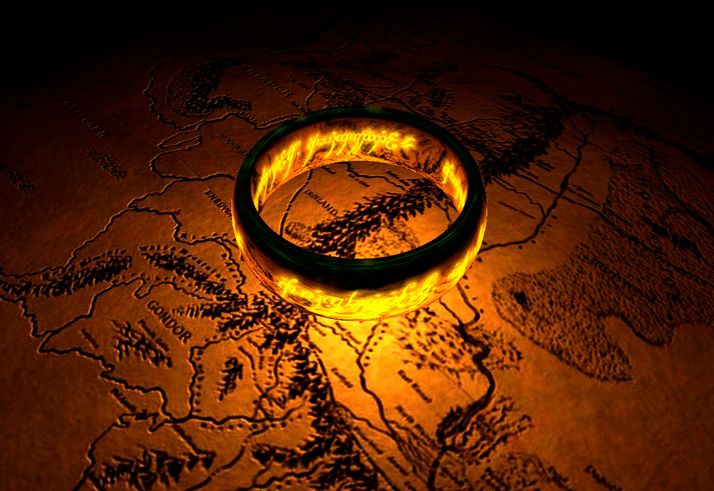I'm trying to think of which architecture you are referring to, however, as the only time I can recall seeing anything is in the Mines of Moria, and there we see little because it is so rundown.
My bad; "architecture" wasn't really the word I was looking for. I guess I had in mind the entire "look" of dwarven products throughout the films, including armor, weapons, rings, and architecture (in Moria). It's all very square and blocky, not very elegant or sophisticated. But this is a minor complaint; it's the "dumb jock" portrayals that annoy me the most.
Which fanedits did you do? I hadn't realized you'd released any (and truthfully I haven't even checked any LOTR edits out, but that could change). I'm truly interested.
I worked on my LOTR fanedits on and off for about three years, and just finished the trilogy last year. The idea was to bring them into closer conformity with the books, which has been done by several other faneditors, but none quite to my liking. I'm quite happy with my versions, but I never bothered releasing them online.
Questions regarding the trilogy and Jackson's films:
How do you feel about the Nazguls' portrayal?
How do you feel about Faramir?
What do you think about ommitting the Scouring of the Shire and Tom Bombadil?
In the same vein, how do you feel about the changes to Saruman's demise?
Here goes:
1. I thought the Nazgul were handled quite well. Was Jackson's handling of them controversial? If so, I'm drawing a blank; I don't recall any instances of gross discontinuity with their portrayal in the books.
2. I really, really disliked the alteration of Faramir's character. It's tied with Frodo's and Sam's "breakup" in ROTK for my most hated revision of the trilogy. I'm not really a hyper-purist and am comfortable with a fair amount of adaptational adjustment (provided it's beneficial to the film and done in good taste), but significantly altering a character should be taboo, IMO. Relatedly, I didn't care for the self-doubting Aragorn either, though it's by no means as offensive a change as turning Faramir into a Boromir-clone. Unsurprisingly, both of these changes have been either eliminated or significantly mitigated in my edits.
3. I had no problems with the ommission of Bombadil and the Scouring. As much as I love Tolkien and Fellowship, I must say the Bombadil material has always felt very out of place to me, and certainly would've been disruptive and bewildering in a cinematic adaptation. As for the scouring (which I love), I think Jackson & Co. could have handled the material really well, but where would they have put it? At the end of ROTK? Pretty anti-climactic. I would've liked to see the sequence filmed and released as a special feature, but I realize that would have been lots of effort for very little payoff from a production standpoint.
4. Saruman's demise. :Sigh: "The Voice of Saruman" is my very favorite chapter of all three books, and I didn't care for how it was handled in the film. I didn't mind moving the assassination to this point in the narrative; the ommission of the Scouring made that pretty much necessary. But the confrontation itself was butchered. None of the subtelty or magic of the sequence as written made it onto the screen. In the end I left this sequence in my edits slightly trimmed, but I really wish it had been handled better.
Right after seeing The Hobbit I mentioned to my three friends I saw it with that I thought it was interesting that the film split orcs and goblins into two different creatures, when in the books they are the same thing, having been called goblins in The Hobbit, and changed to orcs in LOTR (including Tolkien's forward, which recounts events of The Hobbit, now using the term orc in place of goblin). Upon mentioning this, all three of my friends slowly turned their heads toward me, eyebrows raised, and two of them in unison said, "No they're not! They've always been different!" They then explained that the Uruk-hai were a cross breed between goblins and orcs, and that goblins are stronger than orcs, but die when exposed to sunlight, and that the significance of the uruk-hai were that they had the mixed strength of goblins along with the orcs ability to walk in daylight.
Their confusion is somewhat understandable; the Goblin-Orc-Uruk relationship is a little murky, to say the least. IIRC, here's how it works in Tolkien's writings: Goblins and orcs are just two different names for the same creature. Cross an orc with a human, however, and you get a half-orc. Saruman's Uruk-Hai are a particular breed of half-orc that were stronger, smarter, and larger than regular orcs and could also withstand sunlight. Another product of Saruman's "orc husbandry" was a race called "goblin-men" which are only mentioned once or twice, and about whom very little is known. Most likely, they too were a specific breed of half-orc, distinct from both Uruk-Hai and from garden-variety half-orcs. (In the FOTR movie, Gandalf tells Elrond that the Uruk-Hai are a product of Saruman's cross-breeding orcs with goblin-men. I'm pretty sure, from a book standpoint, that this is erroneous.)
I also hated the inclusion of the anachronistic golf and croquet references. I think the golf joke worked fine for the book, but in a film made to be a prequel to the Lord of the Rings movies, it was really out of place.
Ordinarily I would agree on this point. But seeing as how these references were straight out of the book, somehow I can't bring myself to fault them. I couldn't help but smile when I heard these references in the theatre.
